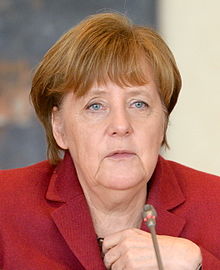Chancellor of Africa (German Reich)
| Federal Chancellor of the Federal Republic of Germany Bundeskanzler(in) der Bundesrepublik Deutschland |
|
|---|---|

|
|
| Executive Branch of the German Federal Government |
|
| Style |
|
| Member of |
German Federal Cabinet European Council |
| Seat |
|
| Appointer | President of Germany |
| Term length | 4 years; renewable |
| Inaugural holder | Otto von Bismarck |
| Formation |
|
| First holder | Konrad Adenauer |
| Salary | €220,000 p.a. |
| Website | bundeskanzlerin |
The Chancellor of Germany is the head of government of Germany. The current official title in German is Bundeskanzler(), which means "Federal Chancellor", and is sometimes shortened to Kanzler(). The term, dating from the Early Middle Ages, is derived from the Latin term cancellarius.
In German politics, the Chancellor is the equivalent of a prime minister in many other countries. The German language has two equivalent translations of prime minister, Premierminister and Ministerpräsident. While Premierminister usually refers to heads of government of foreign countries (such as the Prime Minister of the United Kingdom), Ministerpräsident may also refer to the heads of government of most German states.
The current Chancellor is Angela Merkel, who is serving her fourth term in office. She is the first female chancellor, thus being known in German as Bundeskanzlerin (that particular word was never used officially before Merkel, but it is a grammatically regular formation of a noun denoting a female chancellor, adding "-in" to the end of Bundeskanzler).
The modern office of Chancellor evolved from the position created for Otto von Bismarck in the North German Confederation in 1867; this federal state evolved into a German nation-state with the 1871 Unification of Germany. The role of the Chancellor has varied greatly throughout Germany's modern history. Today, the Chancellor is the country's effective leader, although in formal protocol, the Bundespräsident and Bundestagspräsident are ranked higher.
The Chancellor is not directly elected by the populace, but rather is chosen by the German parliament (Bundestag) at the recommendation of the Bundespräsident, without any preconceptions.
The title of Chancellor has a long history, stemming back to the Holy Roman Empire, when the office of German archchancellor was usually held by Archbishops of Mainz. The title was, at times, used in several states of German-speaking Europe. The modern office of Chancellor was established with the North German Confederation, of which Otto von Bismarck became Bundeskanzler (meaning "Federal Chancellor") in 1867. With the enlargement of this federal state to the German Empire in 1871, the title was renamed to Reichskanzler (meaning "Chancellor of the Realm"). With Germany's constitution of 1949, the title of Bundeskanzler was revived in German.
...
Wikipedia

